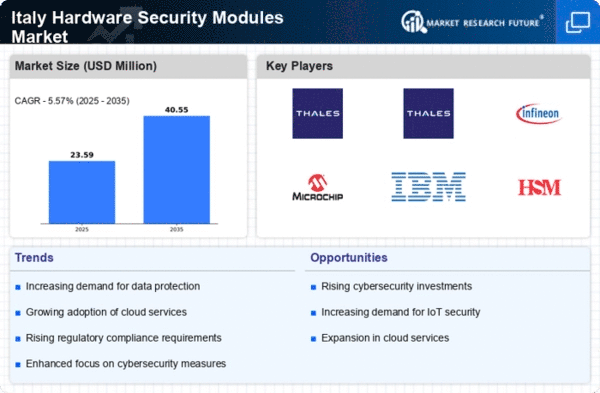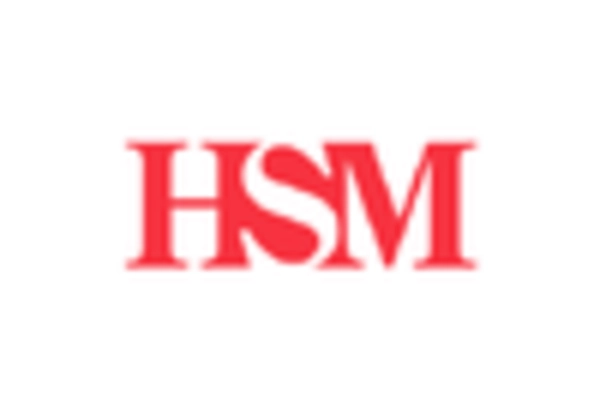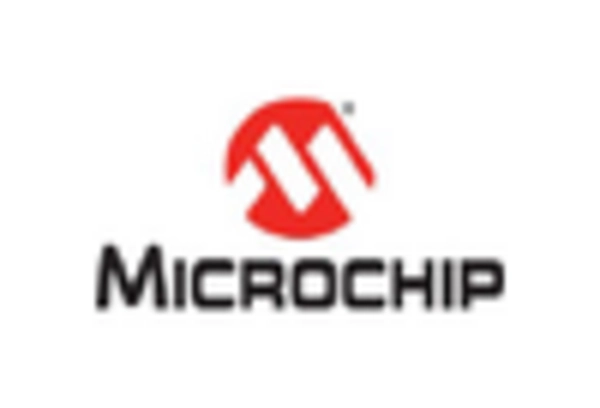Rising Incidents of Cyber Attacks
The hardware security-modules market is being significantly influenced by the rising incidents of cyber attacks in Italy. With a reported increase of 20% in cyber incidents over the past year, organizations are compelled to reassess their security strategies. This alarming trend is driving the demand for hardware security modules, as businesses seek to fortify their defenses against potential breaches. The financial sector, in particular, is witnessing a surge in investments in hardware security solutions to protect sensitive customer data. As organizations prioritize cybersecurity, the hardware security-modules market is likely to see continued growth, as companies recognize the necessity of implementing robust security measures to mitigate risks associated with cyber threats.
Government Initiatives and Support
Government initiatives aimed at enhancing cybersecurity are contributing to the growth of the hardware security-modules market. The Italian government has launched various programs to promote cybersecurity awareness and provide financial incentives for businesses to invest in security technologies. These initiatives are expected to drive a 10% increase in the adoption of hardware security modules by 2026. By fostering a culture of security and encouraging organizations to implement advanced security measures, the government is playing a crucial role in shaping the market landscape. This support not only enhances the overall security posture of businesses but also stimulates the hardware security-modules market as companies respond to governmental calls for improved cybersecurity practices.
Increasing Demand for Data Protection
The hardware security-modules market is experiencing a notable surge in demand for data protection solutions. As organizations increasingly recognize the importance of safeguarding sensitive information, the adoption of hardware security modules has become a strategic priority. In 2025, it is estimated that the market will grow by approximately 15%, driven by the need to protect against data breaches and cyber threats. This heightened focus on data security is prompting businesses across various sectors, including finance and healthcare, to invest in robust hardware security solutions. Consequently, the hardware security-modules market is positioned to benefit from this growing awareness and commitment to data protection, as organizations seek to enhance their security postures and comply with stringent regulations.
Technological Advancements in Security Solutions
Technological advancements are playing a pivotal role in shaping the hardware security-modules market. Innovations such as quantum cryptography and advanced encryption algorithms are enhancing the capabilities of hardware security modules, making them more effective in combating sophisticated cyber threats. As of November 2025, the market is projected to expand by 12% due to these advancements, which are enabling organizations to adopt more secure and efficient solutions. The integration of artificial intelligence and machine learning into hardware security modules is also expected to improve threat detection and response times. This trend indicates a shift towards more intelligent security solutions, which could further drive the growth of the hardware security-modules market as businesses seek to leverage cutting-edge technologies to protect their assets.
Growing Need for Compliance with Data Protection Regulations
The hardware security-modules market is being propelled by the growing need for compliance with data protection regulations in Italy. With the implementation of stringent regulations such as the General Data Protection Regulation (GDPR), organizations are under increasing pressure to ensure the security of personal data. As of November 2025, it is estimated that compliance-related investments will account for approximately 25% of the total spending on hardware security solutions. This regulatory landscape is driving businesses to adopt hardware security modules as a means to demonstrate compliance and avoid hefty fines. Consequently, the hardware security-modules market is likely to experience robust growth as organizations prioritize compliance and invest in technologies that enhance their data protection capabilities.
















